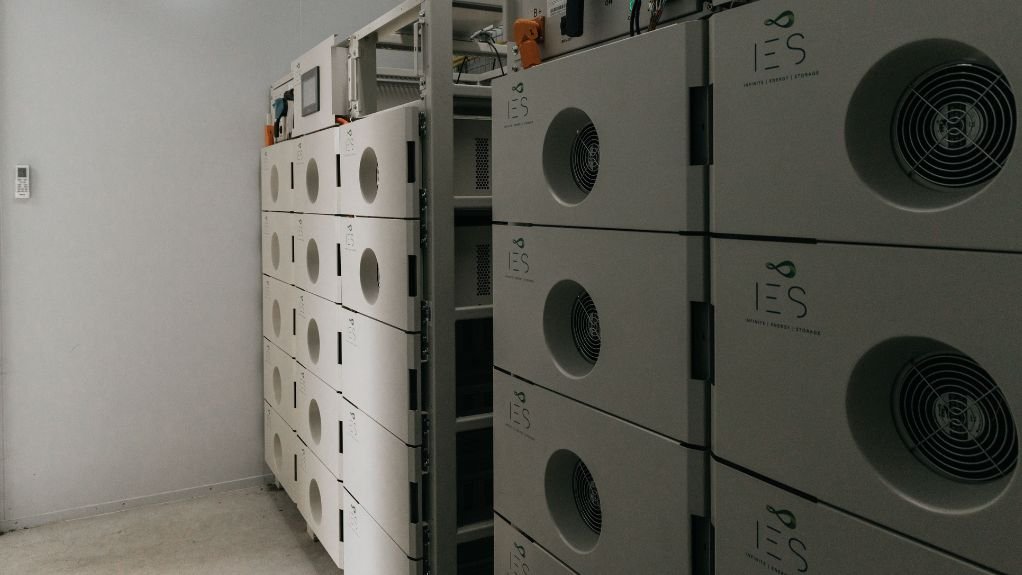BESSs can alleviate tariff pressures


ENERGY ARBITRAGE Energy arbitrage enables users to buy or generate electricity when tariffs are low and use that stored power when tariffs rise
Battery systems are playing a key role in helping industries manage tariff pressures and ensure continuity of operations, says solar and storage solutions provider RenEnergy Africa business development head Juandre Pitout.
He says battery energy storage systems (BESSs) are fast becoming a practical tool for South African businesses aiming to lower energy costs and bolster power security.
As electricity tariffs rise and grid reliability remains uncertain, more companies are exploring the financial and operational value of storing energy for use during expensive peak periods.
Pitout says tariff changes in South Africa have a direct impact on how companies approach energy management.
“If fixed service charges increase over the entire percentage of the utility bill and the cost per kilowatt-hour decreases in percentage of cost, customers with enough capital and available space may choose to go completely off grid.”
However, when the cost per kilowatt-hour or the peak-demand charges increase, it makes more sense to install a BESS, as it allows for energy to be stored and used during periods when solar generation is low, or grid electricity is expensive.
This process, Pitout adds, is known as energy arbitrage, and enables users to buy or generate electricity when tariffs are low and use that stored power when tariffs are at peak. In practice, a battery system can be programmed to charge during off-peak hours and discharge during high-demand periods.
“It’s a simple concept with a sophisticated system behind it. The battery system is programmed to charge and discharge at specific times, helping businesses avoid high costs while also improving sustainability.”
In South Africa, the industries most affected by time-of-use tariffs, such as manufacturing, cold storage, mining, medical facilities and retail distribution centres, stand to benefit most from storage solutions, Pitout believes.
He says municipal commercial customers also face significant peak-time penalties, as local tariffs often include surcharges, in addition to State-owned power utility Eskom’s rates.
“For sites that already use solar PV systems, BESSs can store excess power generated at midday and release it during the evening peak, improving the overall return on solar investments.”
RenEnergy Africa uses digital modelling to help clients understand the financial impact of adopting a BESS. Pitout says his team uses the Homer simulation program to design and optimise systems based on every client’s specific goals.
“While the design process is technically complex, the results are presented in a clear and practical way. We generate easy-to-read graphs that show how energy will be displaced over time, allowing customers to see exactly how the savings work in practice,” he says.
Consistent Power Supply
Energy security remains a top priority for businesses and households. For companies, consistent supply means sustained production and profitability; for families, it means comfort and convenience.
One challenge, however, is helping clients understand tariff arbitrage strategies and the virtual management of physical systems.
RenEnergy Africa’s asset management team addresses this by monitoring system performance and communicating closely with customers. This approach builds trust and ensures that clients fully grasp the value of their investment.
Pitout states that regulatory clarity on tariffs, wheeling and grid connection is essential for the broader adoption of energy storage, as “policy certainty unlocks capital, accelerates deployment and ensures that storage solutions can fully contribute to grid stability and decarbonisation”.
He adds that the practical benefits of storage are now being demonstrated across South Africa.
“As electricity tariffs continue to rise and grid challenges persist, energy storage will become an indispensable part of South Africa’s energy landscape, balancing cost, resilience and cleaner power for the long term,” he concludes.
Article Enquiry
Email Article
Save Article
Feedback
To advertise email advertising@creamermedia.co.za or click here
Press Office
Announcements
What's On
Subscribe to improve your user experience...
Option 1 (equivalent of R125 a month):
Receive a weekly copy of Creamer Media's Engineering News & Mining Weekly magazine
(print copy for those in South Africa and e-magazine for those outside of South Africa)
Receive daily email newsletters
Access to full search results
Access archive of magazine back copies
Access to Projects in Progress
Access to ONE Research Report of your choice in PDF format
Option 2 (equivalent of R375 a month):
All benefits from Option 1
PLUS
Access to Creamer Media's Research Channel Africa for ALL Research Reports, in PDF format, on various industrial and mining sectors
including Electricity; Water; Energy Transition; Hydrogen; Roads, Rail and Ports; Coal; Gold; Platinum; Battery Metals; etc.
Already a subscriber?
Forgotten your password?
Receive weekly copy of Creamer Media's Engineering News & Mining Weekly magazine (print copy for those in South Africa and e-magazine for those outside of South Africa)
➕
Recieve daily email newsletters
➕
Access to full search results
➕
Access archive of magazine back copies
➕
Access to Projects in Progress
➕
Access to ONE Research Report of your choice in PDF format
RESEARCH CHANNEL AFRICA
R4500 (equivalent of R375 a month)
SUBSCRIBEAll benefits from Option 1
➕
Access to Creamer Media's Research Channel Africa for ALL Research Reports on various industrial and mining sectors, in PDF format, including on:
Electricity
➕
Water
➕
Energy Transition
➕
Hydrogen
➕
Roads, Rail and Ports
➕
Coal
➕
Gold
➕
Platinum
➕
Battery Metals
➕
etc.
Receive all benefits from Option 1 or Option 2 delivered to numerous people at your company
➕
Multiple User names and Passwords for simultaneous log-ins
➕
Intranet integration access to all in your organisation

















